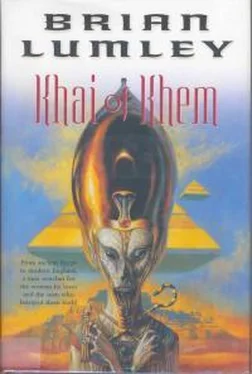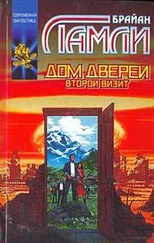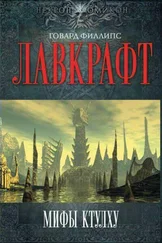They paused on the second floor landing facing a scaled-down three-dimensional model of Hatshepsut’s Temple at Deir el Bahri. Sommers shrugged again. “I know,” he agreed, “it is weird, isn’t it? And I haven’t told you everything.”
The private section of the second floor, where Sommers’s father had his office and study, lay at the west end of the building. Now, as they made their way down aisles of exhibits—between mummy-cases and man-sized models of Ancient Egyptian gods—Arnott asked: “Well, then, tell me the rest.”
“When I came to see you,” Sommers admitted, “it was chiefly to get you to come back here.”
“You succeeded,” said Arnott. “I would go to John-O’-Groats to see that mask.”
“No,” Sommers corrected him, “specifically, I wanted you to meet Omar. He … well, in a way, he’s as big a bundle of mysteries as you are. My father will explain.”
They passed through a door bearing the nameplate of Sommers’s eminent father and through his office, then paused at a second door which would open into Sir George’s study. Sommers knocked lightly and a voice from within said, “Come in.”
“Paul,” Sir George smiled, rising from his chair behind a desk that dwarved his slight figure, “I’m delighted you could come.” He extended his hand.
“How are you keeping, sir?” Arnott politely inquired, taking his hand in a firm grasp. “You certainly look well.”
“Oh, I’m well enough, Paul—and all the better for seeing you. Moreover, I’m more than a little excited!” The professor was small, dapper, gray-haired and always nervously alert and full of a boundless energy. At this very moment, he seemed to sparkle with that excitement he had mentioned, and Arnott could only imagine that it had something to do with him.
“And so you’re up on your feet and out and about at last,” the elder Sommers continued. “And how do you feel?”
“I’ll feel a lot better,” Arnott grimaced ruefully, “when they take this damned straight-jacket off my neck! Wilfred has told me about your peculiar visitor, but he says there’s more still to be told. Perhaps you’d like to enlighten me?”
“Ah!” the professor smiled again. “But I had hoped you might enlighten us!”
“I don’t follow you.”
“Sit down, Paul, sit down. Wilfred, get him a drink, will you? Paul, about this Egyptian, Omar Dassam. Does the name mean anything to you?”
“No, I never heard of him before. Why do you ask?”
“Well, I’ve spoken to him at some length, and to tell the truth—and quite apart from his accent and the obvious difference of character and background—it was much the same as talking to you!”
“How on earth do you mean?” Arnott frowned.
“When he talks about Egypt,” the professor explained, “—about the prehistoric Egypt which predated the ancient land we study and try to understand—then he sounds just like you. It’s almost as if you shared a common source of knowledge…. But listen, you don’t have to take my word for it, you’ll be able to talk to him yourself in a few minutes. He’s on his way over here now. Meanwhile, what do you think of the mask?”
“The photograph? I’d much rather see the real thing.”
The professor nodded and sat down in his chair. He opened a cupboard behind his desk, took out the large, heavy mask and placed it on the desktop where Arnott could see it. Arnott stood up immediately, took up the golden mask and held it up to the light from the window. He stared at it wide-eyed.
At that very moment, there came the sound of footsteps from the office beyond the closed door, followed by a knock and a guttural, muffled inquiry: “Sir George, are you in?”
“You see?” said the professor. “He’s already here.” In a louder voice he called out, “Come in, Omar, come in.”
Arnott heard Sir George’s words, heard the study door open and close behind his back, but he made no move. He remained as he was, as if frozen in that position, with the mask held up to the light. His eyes burned in its reflected glow.
“Ahem!” the professor coughed. “Wilfred, perhaps you’d do the honors?”
“Paul,” came the younger Sommers’s voice as if from a million miles away, breaking in on Arnott’s rapt contemplation of the funerary mask, “this is Omar Dassam. Omar, Paul Arnott.”
Now Arnott turned to gaze at the newcomer. Dark eyes stared into his own, a strong hand reached for his. The man was obviously Egyptian, sharing with Arnott a slim-hipped, broad-shouldered build. “How do you do?” he inquired, sensuous lips forming a curiously cautious smile.
Their hands met.
Dassam glanced down at the hand he held—and immediately snatched his own hand back.
“Wha—? What the devil—!” Arnott exclaimed, startled and angry.
The other carefully took hold of his hand again, pointed at the white groove that ran in a band round the middle finger. “That mark,” he rasped. “Do you wear a ring?”
“No,” Arnott answered. “The mark is a scar—I think. It’s been there as long as I can remember.”
Dassam released his hand, groped in a pocket, brought out two rings. One was silver and he placed it on a finger of his own hand. The other—large, golden, with an ankh relief—he gave to Arnott. “Try it on,” he nodded eagerly, licking his lips, visibly held in the grip of unknown emotions.
Arnott stared at him a moment longer, then pushed the ring onto his finger. It sat in the groove of flesh as if grown there. Then—
The room seemed to reel!
To the two men freshly introduced, it was as if an earthquake had struck suddenly, silently in the heart of London, one whose shock they alone could feel. While the professor and his son looked on in amazement, Dassam and Arnott staggered and fell one against the other, held on for support, then straightened and gazed once more into each other’s eyes. All was as it had been, except that now there was something new written on their faces.
Recognition….
“Khai!” Dassam gasped, his voice choked, breaking as it gabbled something in a harsh, unknown tongue.
“Manek!” Arnott answered in that same tongue. “You, Manek Thotak!”
And in that long moment as the two stared, they seemed to look through their present forms to a time beyond—and they remembered … they remembered.
The center of Khai’s world was Asorbes, the Pharaoh Khasathut’s fortress city. Asorbes stood a mile and a half square, built mainly of limestone, a little less than two miles from the west bank of the Nile. Indeed, the river was clearly visible from the top of the East Wall. Khai had been out of the city as a small child, down the river with his father almost as far as the GreatSea itself, but that journey was only a dim memory now. He did remember, however, that it had been a great adventure; how he had hunted imaginary beasts in the hills and quarries while his father prospected for the fine limestones of his craft.
Of Asorbes itself: Khai had long since explored most of the city at one time or another. He had been atop the massive walls, walking right round the city and back to his starting point all in a single morning. That, too, had been with his father, and Khai remembered how much it had tired the old man. And indeed, Harsin Ben Ibizin was old now. Khai was a child of his old age, conceived of an old man’s seed in the womb of a younger wife.
Harsin Ben, because of his age, was lucky that no younger man had taken his place. He had his rivals, true, but it was also true that no other man in Asorbes or all of Khem had his skills as an architect. His greatest achievement—which stood him high in the favor of the Pharaoh and his councilors and guaranteed his continued employment well into the foreseeable future—was the great pyramid itself, Khasathut’s massive monument, as yet unfinished but slowly nearing completion with each passing season.
Читать дальше








